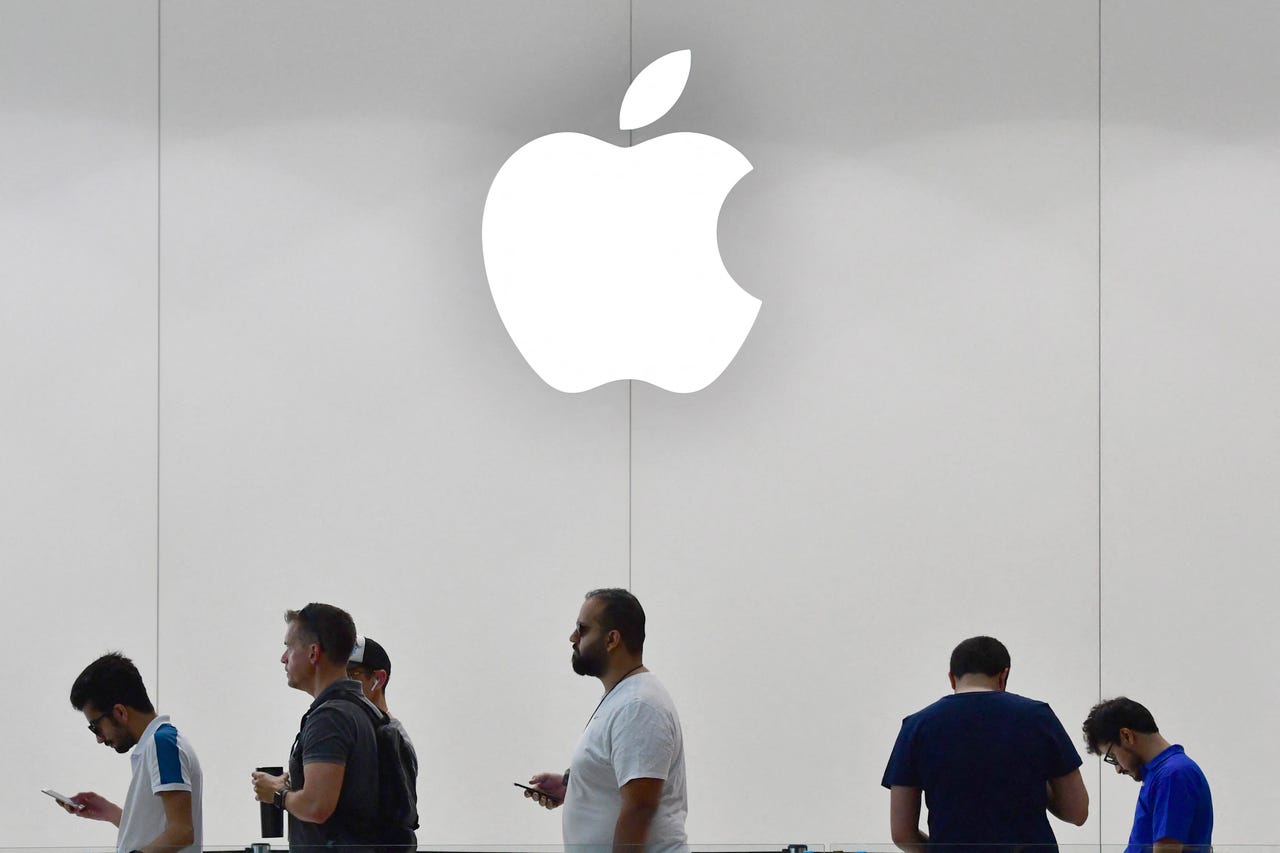
Impact of DOJ's Legal Action Against Apple: Consequences for iPhone Enthusiasts & App Creators | TechDigest

Implications of DOJ’s Lawsuit Against Apple: Potential Effects on iOS Devices & App Creators Explored

GIUSEPPE CACACE/AFP via Getty Images
Over the years, as a tech columnist for ZDNET, I have been closely following the looming legal battle between Apple and regulatory authorities in Europe and the United States that could one day challenge its monopolistic position within the technology industry.
In the EU, due to the Digital Markets Act, Apple has recently been required to make changes to its operating systems and platforms that permit application sideloading and third-party app stores and provide support for external payments.
Apple’s day of reckoning in the US has now come, with a new Justice Department complaint filed in the United States District Court of New Jersey on March 21.
Also: You can now view, search, and filter your entire Apple App Store purchase history
The lawsuit, alleging numerous antitrust violations by Apple, has significant implications for the company and its users. As we delve deeper into this issue, it becomes clear that Apple’s journey from celebrated innovator to being at the center of legal crosshairs encapsulates a broader regulatory and public perception shift.
Let’s explore the potential consequences of Apple’s antitrust lawsuit and what it means for its market dominance and control over the app ecosystem and mobile and services platforms.
Disclaimer: This post includes affiliate links
If you click on a link and make a purchase, I may receive a commission at no extra cost to you.
The Apple user experience at a crossroads
The success of the lawsuit against Apple could result in an era where users have more choices, including access to alternative app stores and many apps outside of Apple’s curated selection.
If Apple is required to adopt a more open system due to the antitrust lawsuit, user experience (UX) on Apple devices could undergo significant changes. For example:
- A more diverse app ecosystem: Users may encounter a broader range of previously unavailable apps (such as Google’s Chromium web browser engine) due to Apple’s strict approval processes. This could lead to more innovative app functionalities.
- Customization options: The ability to sideload apps could lead to more personalized device setups, allowing users to customize their experience according to their preferences without being limited to the App Store’s selection.
- Payment flexibility: If Apple is required to allow alternative payment systems, users may benefit from more competitive pricing, discounts, and offers directly from developers, bypassing Apple’s standard fees.
- Direct developer interaction: Sideloading could facilitate a more direct relationship between app developers and users, improving customer service and feedback mechanisms.
- Enhanced consumer choice: Users could have more choices in default apps for messaging, browsing, and more, diminishing Apple’s ability to set default service preferences.
Newsletters
ZDNET Tech Today
ZDNET’s Tech Today newsletter is a daily briefing of the newest, most talked about stories, five days a week.
Subscribe
Security and privacy implications
However, this newfound freedom within Apple’s platforms may come with certain complexities, as users must balance the excitement of diversity with the apprehension of potential security and privacy risks.
Expanding user options and improving pricing through App Store changes might lead to a more intricate app landscape, requiring users to understand app permissions and security at a much more granular level than previously.
Also: The best VPN services for iPhone and iPad
If the DOJ prevails in its lawsuit, sideloading will be a prime vector of security concern for Apple’s devices.
Sideloading increases the risk of malware infections, phishing attacks, data leakage, and delayed security patches. Users may unknowingly install apps with malicious code, which could compromise their devices and steal their data. Apps outside of Apple’s ecosystem may not follow the company’s stringent privacy standards, making users more vulnerable to phishing attacks.
Sideloading could circumvent iOS’s privacy controls, allowing apps to access and share user data without proper oversight. Apps obtained outside of the App Store might not receive timely updates, exposing users to unpatched security vulnerabilities.
But there is a potential positive side. Allowing sideloading could ensure that Apple’s privacy and security practices are not used anti-competitively. This could help maintain genuine user protection, which is crucial to maintaining user trust and safeguarding the platform’s integrity.
App Store changes
Apple’s financial model heavily depends on App Store commissions, which may undergo significant changes due to this lawsuit, judgment, or settlement. These changes could lead to a more dynamic market, providing consumers with more competitive pricing and a wider range of innovative app offerings. Fundamentally, it could alter the economic structure of the entire digital marketplace.
Following antitrust actions, Apple’s market dynamics could shift in several ways:
- Reduction in App Store fees: Antitrust rulings may require Apple to reduce its upfront commission and yearly subscription fee, which could negatively impact its revenue. However, this may lead to lower app prices for consumers and increased developer earnings.
- Competitive app marketplace: If iOS is opened to third-party app stores, it could break Apple’s monopoly on app distribution and create a more competitive environment where different app marketplaces fight for developer and consumer attention.
- Innovative business models: If Apple’s control is broken, it could encourage innovation as developers will have the freedom to explore new app functionalities and business models. They can experiment with alternative monetization strategies beyond the traditional app purchase or subscription model, such as enhanced in-app advertising, freemium models, or blockchain-based transactions.
Apple ecosystem transformation
Should the DOJ prevail, changes to the App Store, Apple’s services, and other “Super Apps,” as named in the complaint, could affect everything from developer profits to consumer spending habits.
Some possible changes include adjusting Apple’s device pricing, where the pressure to lower iPhone prices could lead to reduced profit margins to align more closely with industry standards.
Also: You can now get Apple product manuals, specs, and repair guides all in one place
The ruling could also affect how Apple bundles and sells digital content and services, potentially leading to more competitive pricing and options for consumers. Additionally, mandates to relax App Store rules could enable broader third-party developer participation and innovation. This could also require Apple to provide more equitable API access, enhancing third-party app functionality and competitiveness.
The changes could also lead to increased innovation and competition in markets such as financial services and gaming, which are heavily constrained by Apple’s current policies. Eliminating artificial barriers would foster a competitive environment for new entrants, and strategies to prevent customer lock-in would facilitate easier transitions to competitor products.
Adjustments to Apple’s revenue practices could ensure fairer conditions for developers, leading to a more open and flexible ecosystem. Overall, the changes have the potential to fundamentally alter the economics of the app market, leading to a more competitive and innovative industry.
Open standards and protocols and the increase of open-source software on Apple platforms
With a requirement for sideloading and allowing third-party app stores and a need for providing more open access to APIs, the call for open standards and increased use of open-source software on Apple platforms may also gain momentum. This shift toward openness will enhance interoperability across devices and challenge Apple’s long-standing paradigms of exclusivity and controlled ecosystems.
- Enhanced messaging interoperability: Mandating support for universal messaging standards like RCS to improve communication between iOS and Android devices.
- Payment, wallet, and digital identity diversification: In addition to new open transaction and digital identity platforms like OpenWallet, we might see further diversification in the digital wallet and payment systems market, reducing Apple’s control over financial transactions with the predominance of Apple Pay on iOS devices, and potentially lowering transaction fees.
- Integration of open source applications: Easier installation and use of open source software on iOS devices, broadening the range of available tools and apps.
- Access to open-source app repositories: Users might be able to download apps from open-source repositories, offering a wider selection of apps and potentially fostering a community-driven app development ecosystem on Apple devices.
Regulatory and industry-wide impact
The Justice Department’s lawsuit against Apple could set a precedent that could significantly impact not just the company but also the entire tech industry. The regulatory impact of this lawsuit could lead to more stringent oversight, which could affect Apple’s operational flexibility and potentially reshape the digital market. A successful antitrust action against Apple could also set legal precedents for other tech giants, leading to a more globally consistent regulatory framework.
Apple, of course, is not giving up the fight. Its response to the DOJ lawsuit, issued on March 21, is as follows:
“At Apple, we innovate every day to make technology people love—designing products that work seamlessly together, protect people’s privacy and security, and create a magical experience for our users. This lawsuit threatens who we are and the principles that set Apple products apart in fiercely competitive markets. If successful, it would hinder our ability to create the kind of technology people expect from Apple—where hardware, software, and services intersect. It would also set a dangerous precedent, empowering government to take a heavy hand in designing people’s technology. We believe this lawsuit is wrong on the facts and the law, and we will vigorously defend against it.”
As Apple navigates these legal and market challenges, it must maintain its hallmark of a secure, user-friendly environment while potentially opening up access to more apps and services. This lawsuit’s implications are profound, and it will be interesting to see how it unfolds and affects the tech industry in the coming years.
Previous coverage
- Apple breaks up advertising. When will the DOJ and the EU break up Apple?
- Apple’s antitrust fight could spell the end of iOS as we know it
- App Store collapse? Sideloading spells the end of Apple’s walled garden
Featured
Why I’m recommending the standard iPhone 16 over the Pro this year (and I’m not alone)
Is OneDrive messing with your files? How to get your Windows storage under control
Best early Prime Day deals under $50 to shop in October 2024
Rust in Linux now: Progress, pitfalls, and why devs and maintainers need each other
- Why I’m recommending the standard iPhone 16 over the Pro this year (and I’m not alone)
- Is OneDrive messing with your files? How to get your Windows storage under control
- Best early Prime Day deals under $50 to shop in October 2024
- Rust in Linux now: Progress, pitfalls, and why devs and maintainers need each other
Also read:
- [Updated] 2024 Approved The Garmin Ultra 30 in Action An In-Depth Exploration
- 1. Enhancing Audio Clarity: Top Tips for Crystal Clear iPhone Phone Conversations
- Don't Miss Out! Apple Slashes Prices for iPad Pro, Making It an Unbeatable Prime Day Bargain - Expert Analysis
- Empowering Education with Technology: The Ultimate 9-Item Tech Checklist for Every Student
- Future-Proof Your Timepiece: Navigating Which Apple Watches Receive WatchOS 11 Upgrade, And Those Excluded
- How and Where to Find a Shiny Stone Pokémon For Motorola Moto G73 5G? | Dr.fone
- How to Lock Apps on Tecno Camon 20 Pro 5G to Protect Your Individual Information
- How to Zoom in Microsoft Teams
- In 2024, The Most Effective Ways to Bypass iPhone 14 Plus Activation Lock
- Tecno Camon 30 Pro 5G Bootloop Problem, How to Fix it Without Data Loss | Dr.fone
- Top 10 Hidden Gems: Unveiling the Genius of Apple Vision Pro - A Deep Dive
- Title: Impact of DOJ's Legal Action Against Apple: Consequences for iPhone Enthusiasts & App Creators | TechDigest
- Author: James
- Created at : 2024-10-23 01:39:17
- Updated at : 2024-10-24 16:24:26
- Link: https://technical-tips.techidaily.com/impact-of-dojs-legal-action-against-apple-consequences-for-iphone-enthusiasts-and-app-creators-techdigest/
- License: This work is licensed under CC BY-NC-SA 4.0.